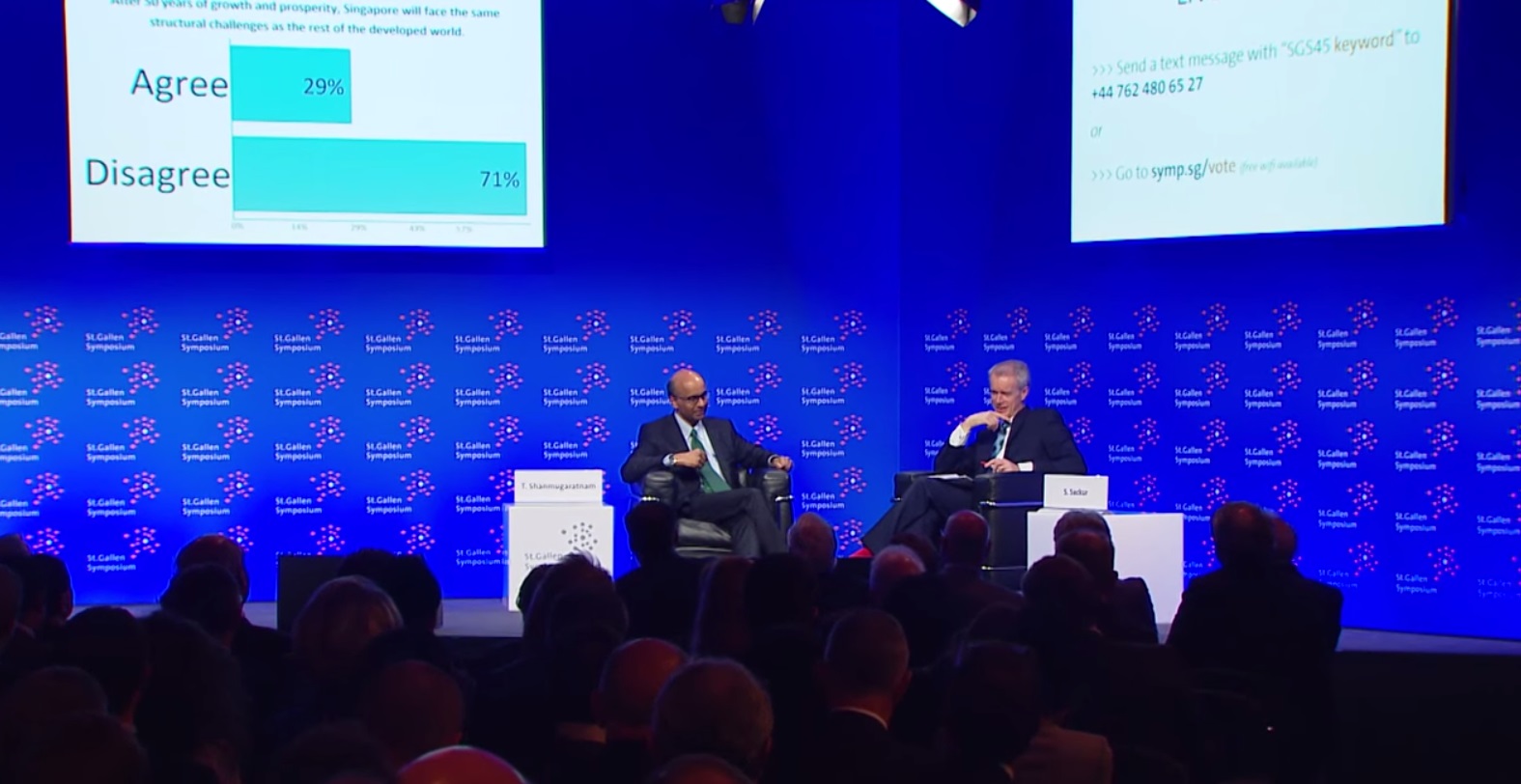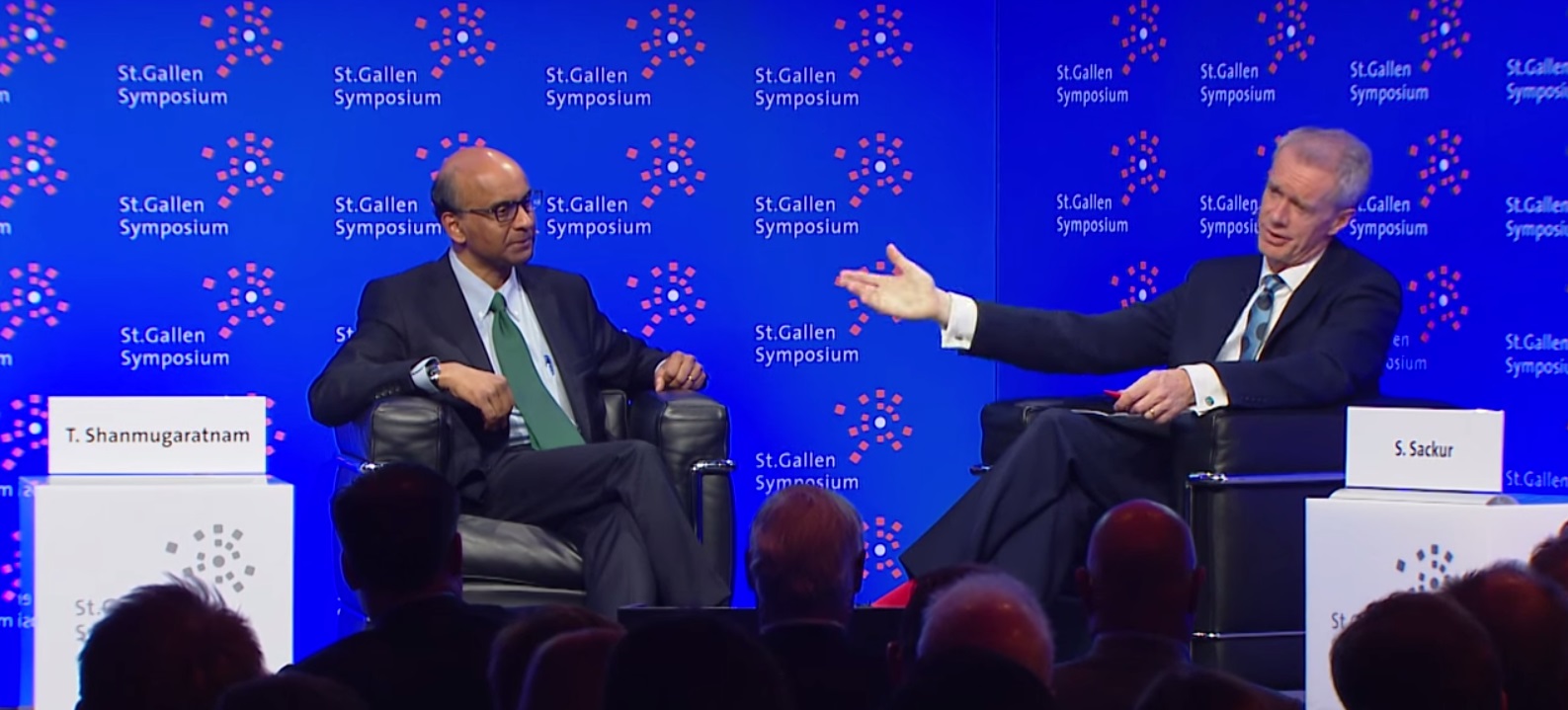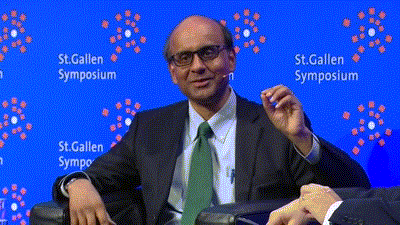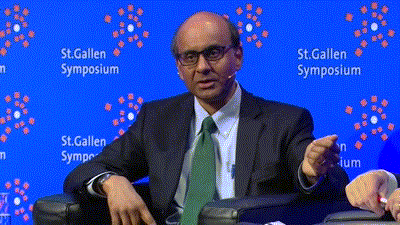Step aside Manny Pacquiao vs Floyd Mayweather.
Deputy Prime Minister Tharman Shanmugaratnam vs BBC's Stephen Sackur was the verbal boxing match many Singaporeans were interested in during the past few days.
" width="560" height="315" frameborder="0" allowfullscreen="allowfullscreen">
Let's recap the seven highlights of the verbal joust that took place at the 45th St Gallen Symposium on May 7 in Switzerland.
"Ladies and Gentlemen, the fighters are in the ring.
Sitting on the left with his trademark suit and a green tie, he is recognised around the world as Euromoney Finance Minister of the Year 2013, former Chairman of the International Monetary and Financial Committee in IMF, Tharman of Tarman Jurong...
Tharman...Shanmugaratnam
Sitting at the right corner and needing no introduction to the world who watches BBC HARDtalk,
Let's welcome the reigning 11-year BBC host, tough-talking successful "griller" of George W Bush and Bill Clinton...
Stephen... Sackur".
Round 1: Democracy! DPM Tharman made his case for Singapore's model of democracy by blitzing past Sackur's interjections (9:28 - 10:22).
Sackur: To some of our sensitive flowers in the West, the authoritarianism that underpins that approach to managing a society feels uncomfortable.
Tharman: Yup, so that’s a caricature. I mean, even The Economist, which is not exactly a cheerleader for Singapore, would say, as it just did in its editorial form of obituary when Mr Lee Kuan Yew passed away, that Singapore has free, fair and regular elections.
We are a parliamentary democracy, not in exactly the same mould as Britain or the United States certainly.
Sackur: No...I mean I think...Your
Tharman: A parliamentary democracy where an elected government makes decisions where it feels are in the best interests of the country today and for the future. And we are accountable for it.
Round 2: Press Freedom! DPM Tharman responded to the usual criticism about the free press in Singapore and "lured" Sackur into thinking that the British form is a compliment (10:22 -13:25).
Sackur: Yeah. It’s a democracy of sorts. You don’t have a genuinely free, truly liberated press ...
Tharman: Not in the British sense.
Sackur: No. Much as I would like to take credit for the notion of a free press, it's not a British idea...
Tharman: I didn't mean it entirely as a compliment.. (to the crowd's laughter).
But as a description. But as a description (to the crowd's laughter).
Sackur: You are missing page 3 of the Sun newspaper and that's a great loss and I agree.
But actually there is a serious point.
Tharman: There is.
Sackur: When journals that are respected and have a role to play, like The Far Eastern Economic Review, for years and years, are hounded by your government.
Tharman: No, the rules are very clear and simple. Singapore is an extremely open society, by virtue of the number of foreign publications that are circulated — well over 5,000. The fact that Singaporeans are, probably more than any other society, broadband-penetrated, and the English-educated have access to a whole world of information on the Internet. It is an extreme open society. There is no doubt about it.
We are unconventional in requiring in our laws that we have the right to reply when foreign publications publish something that we feel is false or misleading. And when publications refuse to publish a reply, we impose restrictions on them that affect their advertising revenues. Unconventional, you might not agree with it, but the larger point is this: We all need some humility on the ways that best advance a liberal order. We all need some humility as to how we achieve that, not just for today, but for tomorrow. How do you sustain it? The most thoughtful observers in the West are of the view that you need some buffers, some margins of safety, and you need some compromises on some liberties in order to achieve others.
And the freest possible media is not the only liberty we aspire to. I do think it’s a good idea, by the way, it appeals to my ideals, but it is not the only liberty you aspire to. You do aspire to a liberty of being able to walk the streets freely, particularly if you’re a woman or a child, at any time of the night; you aspire to the liberty of living in a city that is not defined by its most disorderly elements; you aspire to the liberty of having the opportunity for an education and a job, regardless of your race or social background; and you aspire to a liberty of practising your religion without fear of bigotry or discrimination. Those are very important liberties in many societies, and they are lacking in many societies.
Round 3: Singaporeans first! Tharman speaking and appealing to the better angels of Singaporeans' nature (16:08-17:02).
Sackur: Simplistically put, is there going to be room for more individualism in Singapore in the future?
Tharman: If you look at Singapore today, compared to ten years ago, it's a vastly different place. Singaporeans are educated, discerning, skeptical, and critical people. They know what's what. There's no doubt about it. And Singapore continues to evolve.
It's a function of course of the fact that we had some success in education, it's a function of the fact that, you say, is a digital world. It's an open world. That's no doubt about it. But let's not think that we are all moving teleologically towards that destination that you now see in the United States or UK. We all have to evolve. And we all need some humility as to how we progress democracy.
Round 4: Big government and the Swedes! DPM Tharman spoke about the size of government and government spending, and engaged in a word-play about the Swedes (22:15 - 24:44).
Sackur: If you look at the figures, your government is an advocate of massive state spending. I mean, that’s the way you run your country. Because you’ve got such a successful economy, you’ve managed to do it with budget surpluses until last year, when you fell into a deficit. And I don’t know whether you are worried, but looking forward, particularly if you mix demographics with the size and ambition of your government, you are going to run into real problems.
Tharman: I think we’re a very interesting case of a country that has low government spending, by the way, by most standards, as a percentage of GDP. Low taxes.
Sackur: As long as your GDP keeps climbing.
Tharman: Yes, but our starting point is not a bad one. We’ve got relatively low government spending and revenues, but we’re able to achieve the social outcomes that countries with much larger spending do. And how do we do it? I think one of the very important lessons of the last 50 years is that traditional concepts of welfare, social expenditure and government intervention have led to a weakening of private initiative and personal responsibility. Not because that was the intent. It was never the social democratic intent to weaken private initiative and family responsibility.
I mean, look at the Scandinavian countries. They used to be among the most hardworking countries in the world. The Swedes were incredibly hardworking, industrious people.
Sackur: You’re using the past tense, are you? The Swedes have become lazy? Or what’s happening?
Tharman: Present active tense (crowd laughing).
They’re a good society in many ways, and they’re willing to pay high taxes to keep their system going.
Sackur: Well, Swedes will get the chance to comment on this at a moment.
Tharman: But the point is, there are ways in which an active government can intervene to support social mobility, develop opportunities and take care of the old, which doesn't undermine personal and family responsibility. And that’s the compact that we’re trying to achieve. And it’s almost a paradox.
Sackur: You mean you’re a bit more ruthless. Is that what you’re saying?
Tharman: No, we’re achieving a paradox of active government support for personal responsibility, rather than active government support to take over personal responsibility or community responsibility.
Round 5: Safety net! DPM Tharman gave the soundbite of the week and made Sackur "stunned like vegetable" for ten seconds (24:45-26:09).
Sackur: Do you believe in the concept of a safety net?
Tharman: We believe in a concept of support for you (people) taking up opportunities. So we don’t have unemployment.
Sackur: I believe in the sometimes simplicity of yes-or-no answers. What about this idea of a safety net? Does Singapore believe in the notion of a safety net for those who fall between the cracks of a successful economy?
Tharman: I believe in the notion of a trampoline (A laughter and silence in the crowd for ten seconds).
Sackur: So people are just bouncing up and down in Singapore?
Tharman: No, it boils down to what policies you’re talking about. If you provide help for someone who is willing to study hard; if you provide help for someone who is willing to take up a job and work at it, and make life not so easy if you stay out of work; if you provide help for someone who wants to own a home — and we are very generous in our grants for home ownership, which is why we have 90 per cent home ownership and, among the low-income population, more than 80 per cent own their homes — it transforms culture.
It’s not just about transactions, it’s not just about the size of grants, it’s about keeping alive a culture where I feel proud that I own my home and I earn my own success through my job. I feel proud that I’m raising my family. And keeping that culture going is what keeps a society vibrant.
Round 6: Singapore exceptionalism! Tharman discussed about how unexceptional Singapore is (26:52 - 27:37).
Sackur (referring to an on-going online vote by the audience): After 50 years of growth and prosperity, Singapore will face the same structural challenges as the rest of the developed world. 71% of you disagree, presumably you believe, as the Americans will say, "Singaporean exceptionalism", which is an interesting idea, do you believe in Singapore exceptionalism?
 Screenshot of video
Screenshot of video
Tharman: No, I don't. I don't at all. Very little of what Singapore does is invented in Singapore. Very little.
Our whole SOP (Standard Operating Procedures), whether it's in Cabinet or Statutory Board or small public agencies, is "look at the rest of the world". Try to get some ideas, some techniques, some methods, that have worked well and see how we can do it in Singapore, if possible, better.
Try to avoid the mistakes that have happened. So that's an advantage of smallness, by the way - we never thought that we had it all in our minds. We never think today that we got it all worked out and this is a successful model and that's it. We are never in a golden mean.
Round 7: Political dynasties in Singapore! Sackur found an opening when DPM Tharman spoke about Singapore's advantage in being constant - keeping to your promise and building confidence.
Sackur: And being constant, does that mean that Lee Kuan Yew’s family will always be in charge? (to giggles in the crowd)
Tharman: No, I think that will be most unusual. It’s a meritocracy. It will be most unusual if that was the case. Certainly, it’s not the way in which – I can’t speak on behalf of them – it’s not the way most Singaporeans would expect it to be. And certainly, you really wouldn’t want it to be a situation like…
Sackur: I thought you are talking about the United States - either the Bushes or the Clintons.
Tharman: I mean to be frank, if you look at parliamentarians below the age of 30 in India, every single one of them is a member of a political dynasty. Every single one of them. So, we believe in meritocracy, it’s hard work, sometimes it’s imperfect. There’s always advantage in family connections and wealth but we got to keep working against that.
So how was Sackur's experience in St Gallen?
I'm in Switzerland at #StGallenSymposium. Singapore's Dep PM just pumped me for info abt outcome of #GE2015. The world is watching...
— stephen sackur (@stephensackur) May 7, 2015
Yup.
DPM Tharman.
Pumped.
Stephen Sackur.
#That'sWhatHeSaid.
Articles you may like:
12 ways DPM Tharman is proof that talent is unevenly distributed in the PAP
Everything you need to know about DPM Tharman’s Budget Speech 2015 in 90 seconds
Did DPM Tharman reply to blogger Roy Ngerng’s questions at the IPS forum?
Top photo from here.
If you like what you read, follow us on Facebook and Twitter to get the latest updates.
If you like what you read, follow us on Facebook, Instagram, Twitter and Telegram to get the latest updates.


